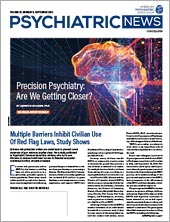Informed consent must be well understood and respected by those responsible for providing health care services to patients. The purpose of informed consent is to ensure patients have been provided with sufficient information to make an informed decision about their health care. The responsibility for obtaining informed consent rests with the psychiatrist providing the proposed medical care, treatment, or procedure, and this responsibility may not be delegated.
Ongoing Collaboration Is Key
The informed consent process is guided by federal and state statutes and regulations, case law, professional codes of ethics, Medicare Conditions of Participation, national accreditations standards (such as The Joint Commission and DNV), and provisions of medical staff bylaws. Age of consent by minors varies widely by state.
Informed consent is an ongoing collaborative communication process between psychiatrists and patients. The signing of the consent form is validation that the process has occurred and an agreement has been reached. The communication process includes the following elements: a description of the indications for treatment; an explanation and purpose of the proposed treatment/procedure; the probable risks, benefits, and alternatives; and a description of the risks if patients do not consent to the proposed treatment/procedure/or alternatives.
Risk Considerations for Effective Consent Communication
Decisional capacity is the ability to understand and appreciate the nature and consequences of the decision. The determination of decisional capacity is made by a physician and must be documented at the time consent is obtained as this question will be brought up in any allegation of negligence involving informed consent. If the patient lacks decisional capacity, the patient’s legally authorized agent must consent.
Patients determined to have decisional capacity have a fundamental right to decide whether to authorize or reject proposed medical care, treatment, procedures, or surgery. Patients with decisional capacity also have a right to change their mind and withdraw from previously authorized care and treatment.
Documentation of the informed consent process is critical to defend a claim of medical malpractice and/or battery. To bring a claim for lack of informed consent, the patient must demonstrate that if adequate information had been provided, the patient would have elected to make a different decision. A battery claim may be brought for any unauthorized treatment or touching of the patient, even if the standard of care was followed and no harm occurred.
The consent process is ongoing and may involve multiple discussions. Patients should be allowed to ask questions and receive answers in language they can understand. Each informed consent discussion should be documented. If patients refuse care or treatment, informed refusal must be documented, including that they had the opportunity to ask questions and to “teach back” what was discussed to verify their understanding. Documentation must also be maintained in the event patients decide to withdraw a previously provided consent.
If applicable, obtain patients’ authorization when involving the family in care and treatment discussions. It is equally important to document the family’s involvement in decision-making and informed consent discussions.
Bottom Line
Patients have the right to make informed decisions regarding their health care. Informed consent is an ongoing process that includes a dialogue between the psychiatrist and each patient and allows for questions to be asked and answered. Documentation of the informed consent process is important to demonstrate informed consent was conducted in accordance with federal and state statutes and regulations, professional codes of ethics, and the standard of care. ■
Risk management services are provided as an exclusive benefit to insureds of the APA-endorsed American Professional Agency Inc. liability insurance program. This information is provided as a risk management resource for Allied World policyholders and should not be construed as legal or clinical advice. This material may not be reproduced or distributed without the express, written permission of Allied World Assurance Company Holdings, Ltd, a Fairfax company (“Allied World”). Risk management services are provided by or arranged through AWAC Services Company, a member company of Allied World. © 2022 Allied World Assurance Company Holdings, Ltd. All Rights Reserved.


